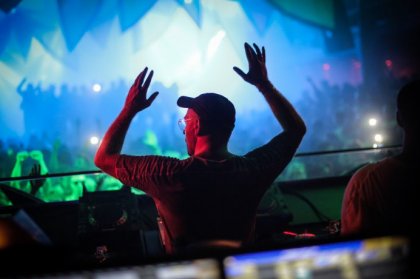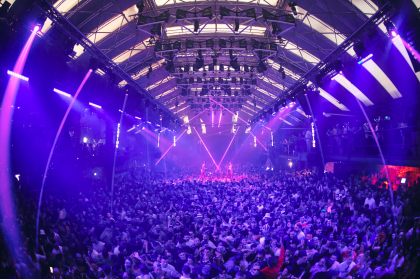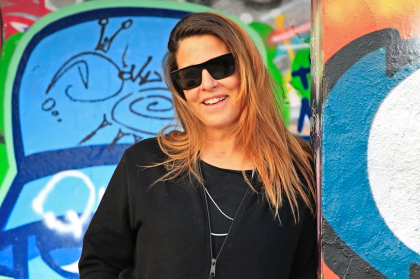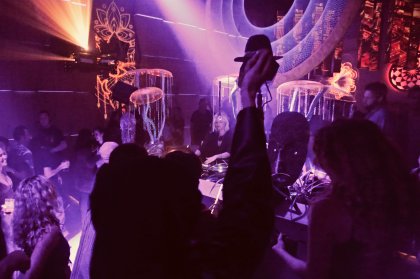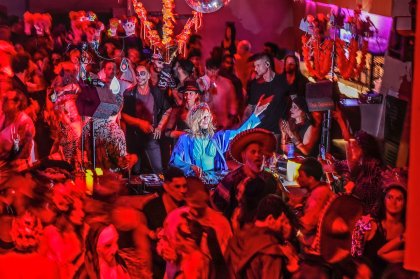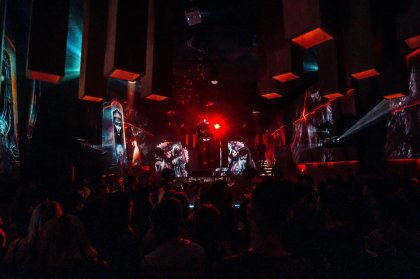'This year - 2013 - has been the most productive in my entire life.' - sitting down with Mathias Kaden I was intrigued. Few 'artists' in todays fray boast such a consistently original back catalogue - fewer still occupy their own peerless DJ niche and none at all supplement their club performances with live jazz-fusion collaborations.
Fiercely grooving yet emotive sets spun with percussive heavy hooks and refined layering tools characterise the Germans personal take on house and techno. Employed by Berlin club Watergate to mix the fourteenth edition of their in-house compilation series here is a man in high demand. A constant slew of remix requests and a bristling gig schedule come as deserved products of his own ideals: be original and be true. Springing from wonky minimal drips to irresistibly danceable tech-house Kaden comes across as a real musician with the drive to pursue projects beyond the clubbing sphere - his 2009 full length album Studio 10 defied expectation with its live instruments, percussion and vocal led 'songs'.
This summer Kaden was again welcomed into Väth's Cocoon Ibiza fold, playing multiple dates at the long-standing Amnesia party and featuring in the brands Tipic-Formentera residency. With a recent EP on the Desolat imprint, previous releases on Vakant, Freude Am Tanzen and Raum...musik and the upcoming eponymous Watergate mix Kaden has continued his steady rise to the industrious, well-respected echelons of electronic music. This respect is the result of a refreshingly pure work ethic, a desire for self-propagation and a bone fide love of music.
I caught up with Kaden the evening after his performance at Tipic to discuss his broad spread of work; artistic freedom; the importance of originality and the joy of accidents.
With your Studio 10 piece it was unconventional with respect to what people expected - assuming that all electronic artists exist solely in the 'dance' world. With the Watergate mix, did you have - or were you given - a specific direction? How did the series itself influence how you approached it?
"Actually they asked me two years ago. I was supposed to make the second or third mix CD but I had no time. This meant I had a lot of time to think about in which direction I wanted to go but in the end it was very easy. I love to play in Watergate - always for a very long time - and so I wanted to present the music that I play then. Just like in the club, I start more slowly and step-by-step I build it up. Obviously on the mix CD you have 70 minutes and not the 6,7 hours that I usually have but I really tried to create the same feeling."
"I wanted to say: 'this is what I am as a DJ' or 'this is my style when I play at Watergate'. Of course I always have the same style but at Watergate I can play more pumping house tunes instead of techno. In the end I think I chose the right tracks."
With your earlier music, for instance on Vakant - and listening to the surrealist dreaminess of the Watergate DJ Koze track - you manage to inject a certain warm weirdness into your tracks - a certain emotion.
"When I did my first minimal tracks they were colder, darker and weird - I worked to create my own sound step-by-step. I loved to use the percussion but then everybody started doing this percussion thing and so I stopped doing that - and concentrated on creating groove. A track can be house or techno but it must have a groove - yet never punch in the face. Although I don't use as much melody I can create this emotion solely with the percussion and the groove, it is more timeless this way."
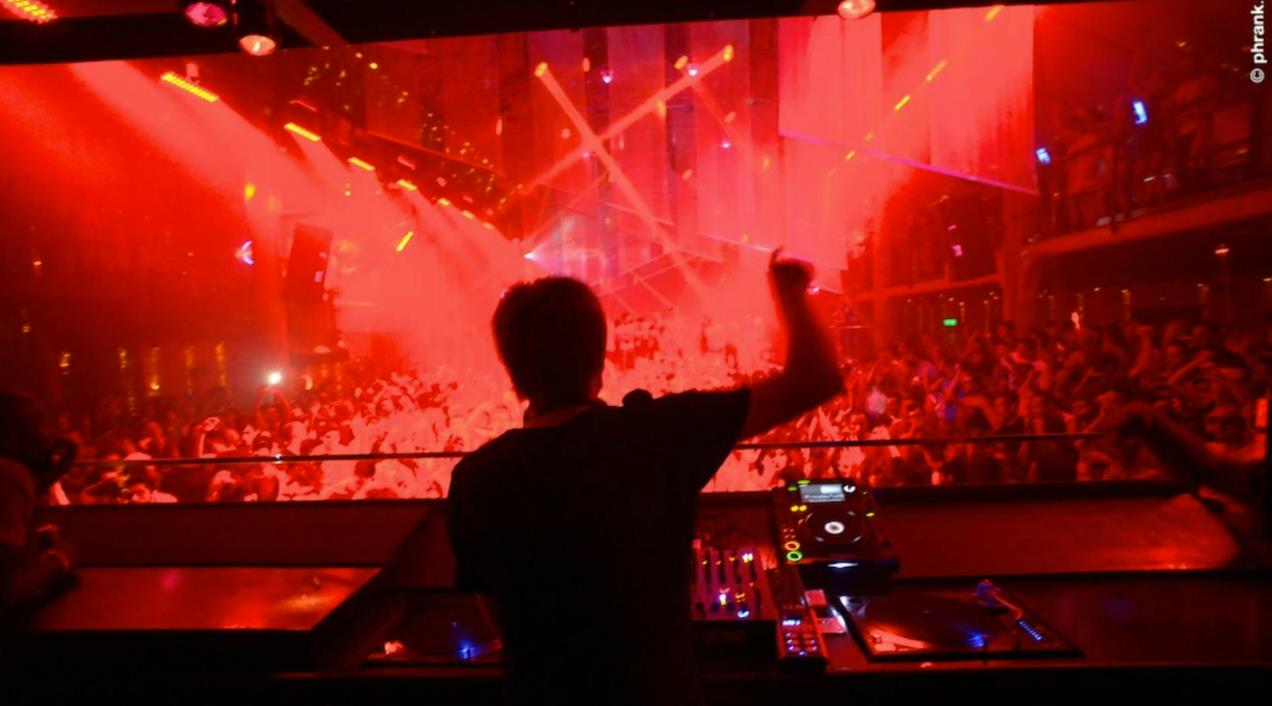
You do not follow trends or fads. Do you deliberately avoid the current sound of a moment or is it simply a product of your own creativity?
"I will never say 'ah this is in so I will do the opposite' for the sake of being cool. The good thing is I created my own freedom. With all my bookings and people who listen to me they do not book me because of my production, they book me because of my DJ-ing: that I DJ the way I do. This means that my bookings are not influenced by trends - I am above them."
"Also, I do not consider myself a 'professional producer'. If I like a bass line then I might create something that has the sense of the source, but I do not have the ability to re-create it fully."
Your initial minimal work is peppered with unique, interesting sounds whilst your more recent outputs are famed for their intricate percussion - you constantly try to develop your sound. It seems many producers in the current climate are more concerned with making generic, danceable records with little real creativity.
"There are a lot of artists who use only presets but it can be okay because they make a big mistake and it sounds very good - because they don't know what to do. It is so easy nowadays to buy Sample Packs to use in a DAW, in my opinion if you never buy a real machine then you shall never be able to create your own style. In the end you can of course do a lot of things with the computer and with MIDI files but it shall still never be a unique style."
With sampling and DAW presets then, you shall never be involving an original source. Do you focus only on analogue then?
"I am a big Roland, Korg and Yamaha fan. If you never buy a real machine you will never create your own style. I have a lot of machine but only use them for half of what they can do."
Talking of producing 'accidents', is that something that happens with you and your machines?
"My first record on Vakant - Circle Pit - was a mistake. I did something wrong and at the end I was like 'wow. what is this.' and I'd created something good. I think music is also about learning from mistakes. But the feeling can get lost: as you learn more and more you hear a sound - and you know how to make it. I think they are not so many mistakes coming anymore. It's shit. I want to be young again."
With Studio 10 you did lots of live percussion, is this something you are still very interested in?
"I still have the congos and drums in my studio but for the last three years I haven't used them. For my own tracks I still love the 808 and 909 for the beats and have a very good pianist. For my Watergate CD I have made a record Fin. It is only with the 909 - a the bass line and the piano: very simple. It is not a hit and it may disappear somewhere but it is true. There is nothing assembled, it is made in a studio session with my equipment and recorded live."
Your Tentakle EP on Desolat contains a number of DJ Tools. Do you engage with 'tools' as a DJ-ing element?
"I like to use tools. The tools started as tracks that I was going to release but could not complete so I had the option: put the entire thing in the garbage or pick out certain elements to use as loops..It's good when a record has associated tools because you can use them to push the dancefloor or to fully complete a track. I still play with decks and vinyl and don't use some big FX rig so the tools allow me to push tracks without using a big reverb or delay."
With the overtly accessible nature of music now. Is it important to maintain the 'exclusive DJ edit'?
"I do alot of edits. Sometimes I love a track but it is just too slow so I put a beat under it. I have many examples which I love to play but do not want to release, it is just for me, to create my own DJ sound."
Percussion-wise, do your influences come from a certain area outside of electronic music or do you just 'jam' ?
"I jam. The inspiration comes from outwidth electronic music. Some producers use it [percussion] in the wrong way, you can hear it is played by the computer - that it is MIDI based. No one plays real drums in such a static way. If you play a beat on the table in front of you it will sound much better than a clipped MIDI loop. Invite a friend who plays percussion: It is much better to have a living track."
You released an album as part of a live band project, Karocel earlier this year.
"We began in 2010 - a fusion of myself and a local jazz band from my area 'Marbert-Rocel'. We took the 'Ka from Kaden, and -'racel'. We began by mixing my tracks with theirs and went on tour. It was a success. We said we'd write an album and this year we succeeded, it is a ten track record - Plaited - and came out on Freude Am Tanzen in June."
What are you working on currently?
"This year, 2013 has been the most productive in my life. Upcoming - I have a remix for Monika Kruse, one for Daniel Stefanik, one for DJ Koze on Pampa and there is another side project, Mathimidori with a Japanese singer on Mule Records with a Lawrence remix."
In the current scene, do you think producers are pressured into delivering a constant, more danceable output?
"People now expect less. It is different. Not so people are interested in good music. There is a small scene, like in the 90s. If people are truly interested in music they expect nothing: they want to be surprised - and there are not so many surprises any more: this is not nice."
